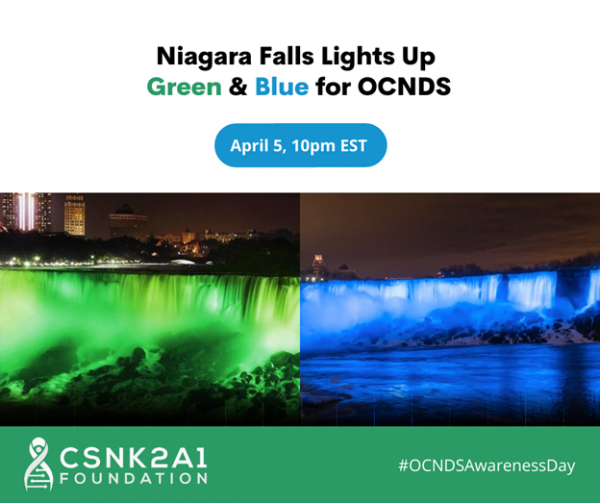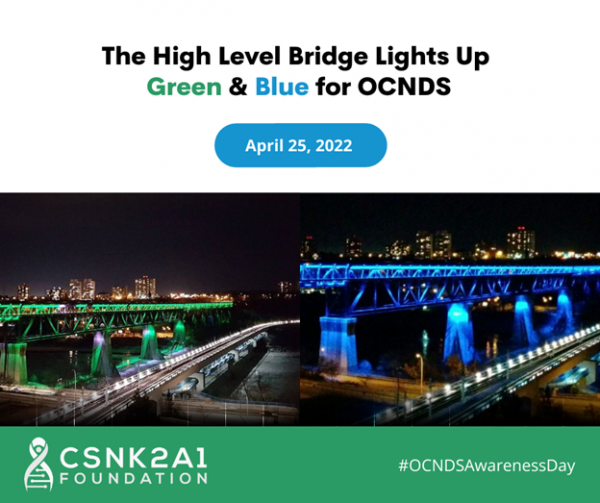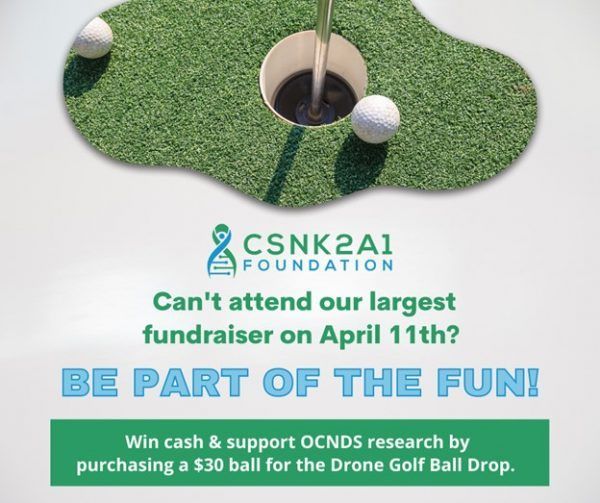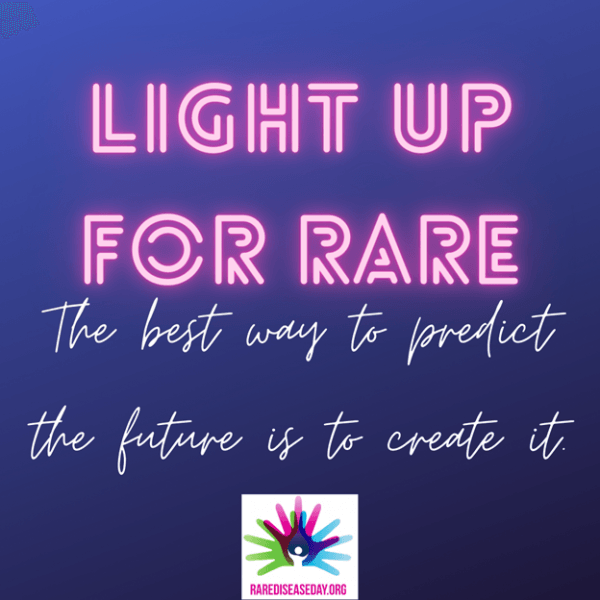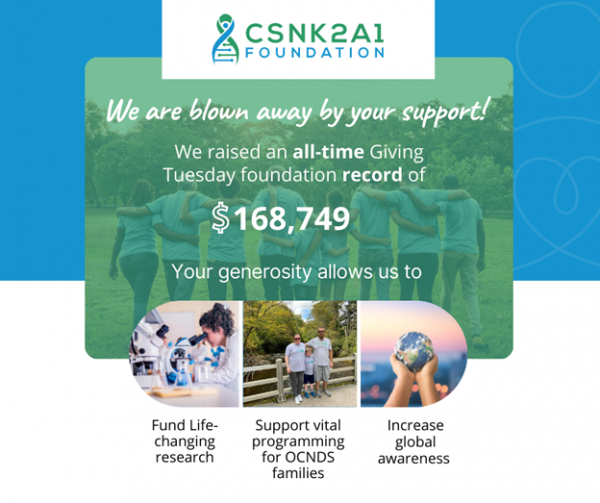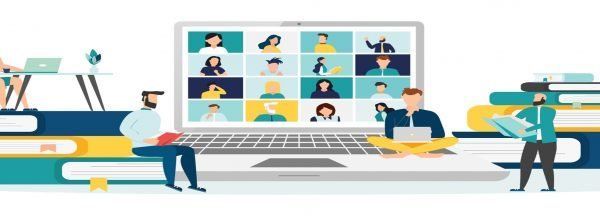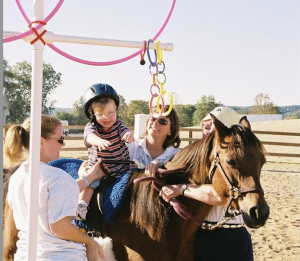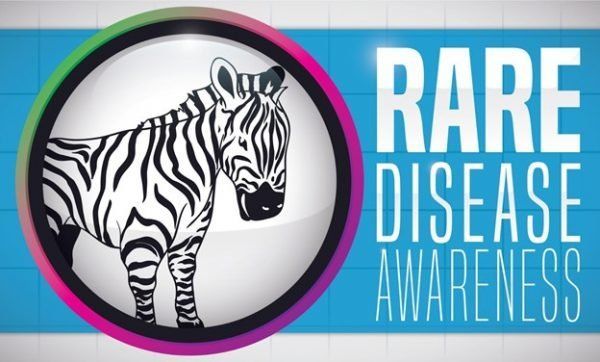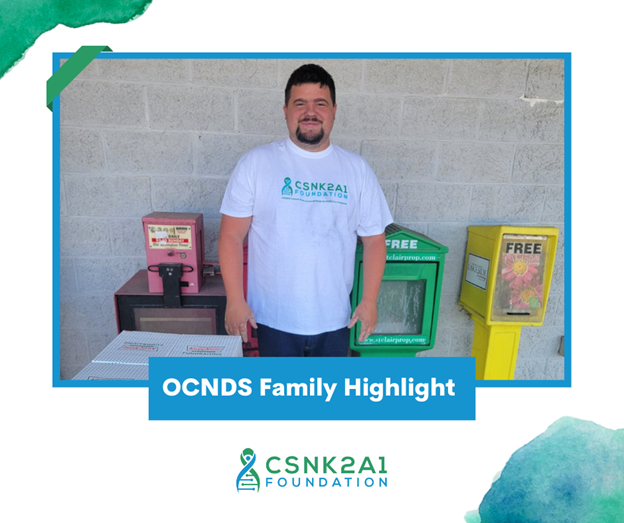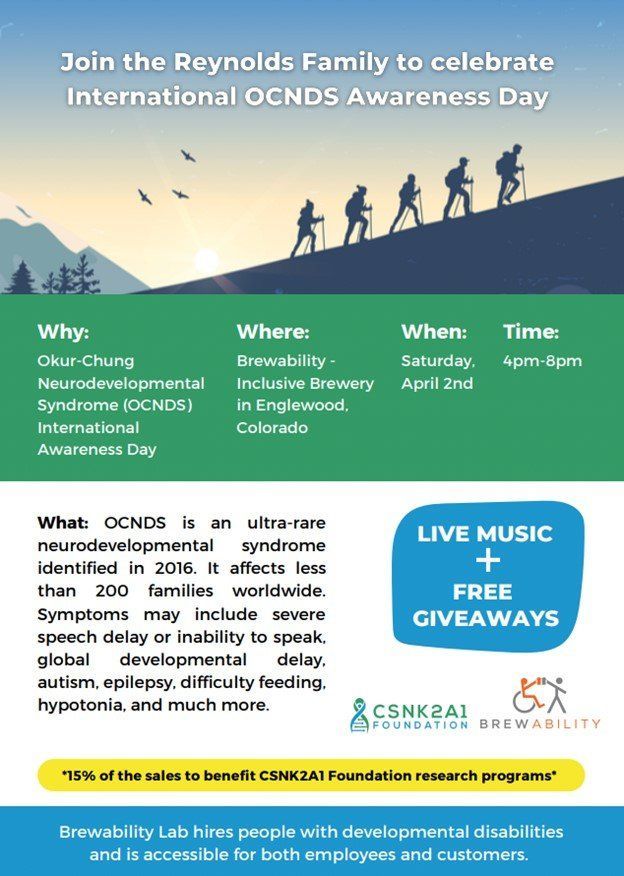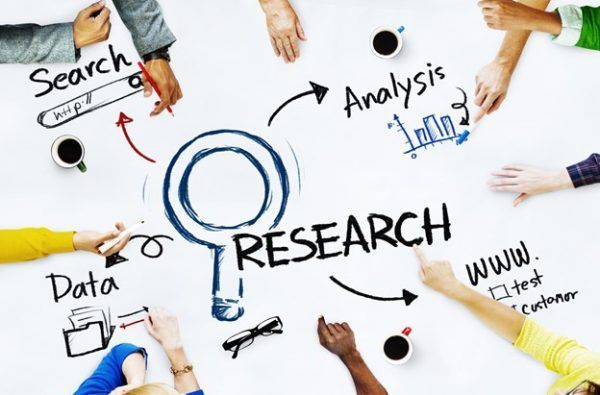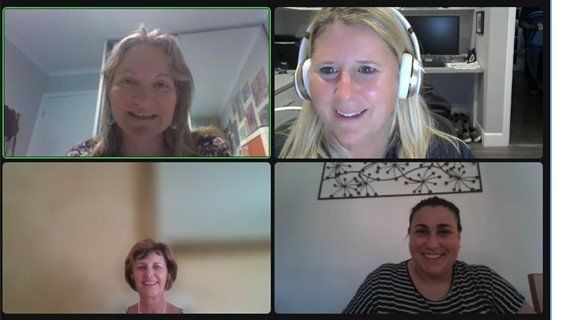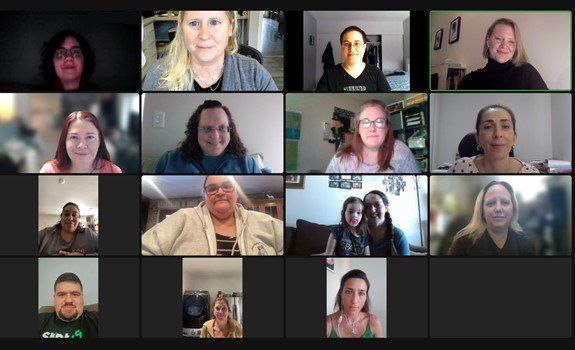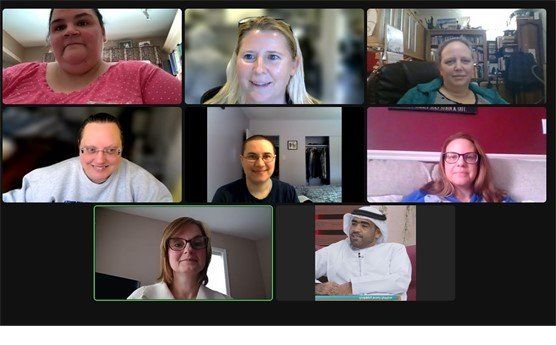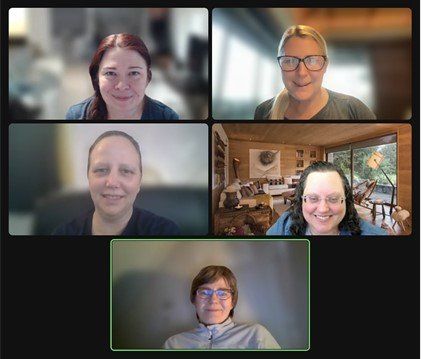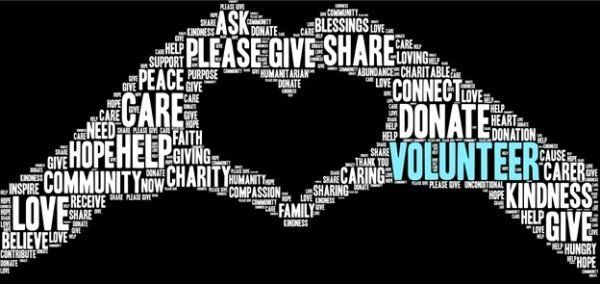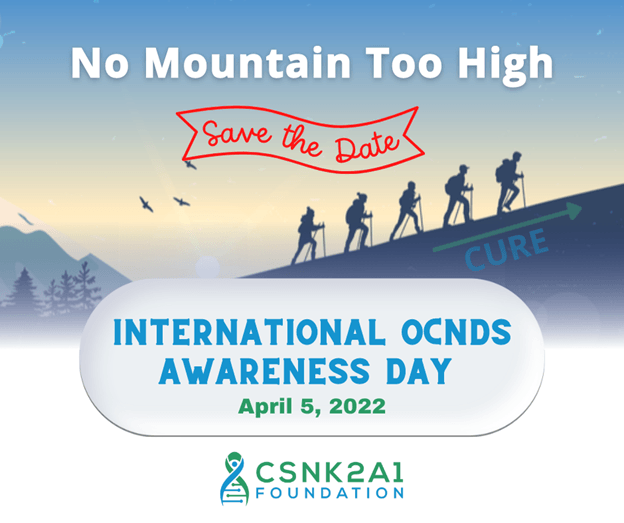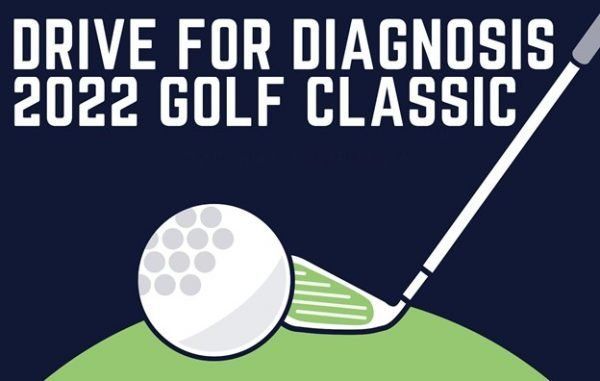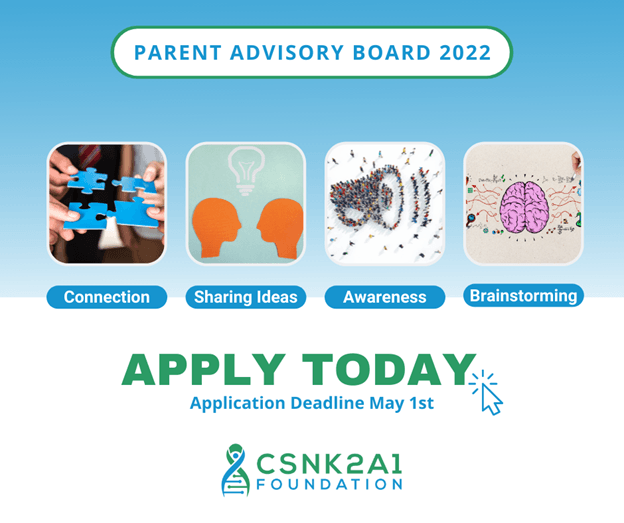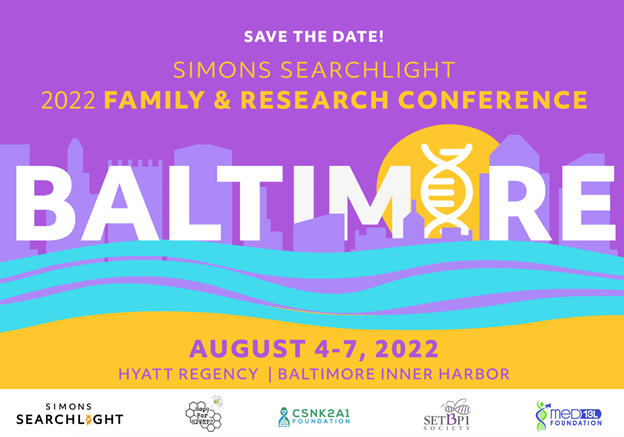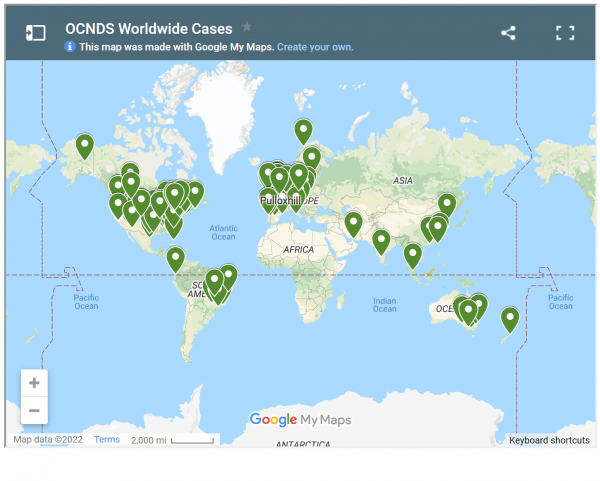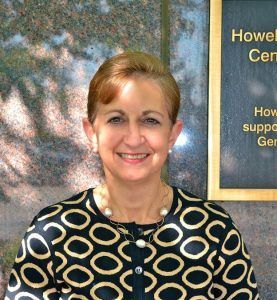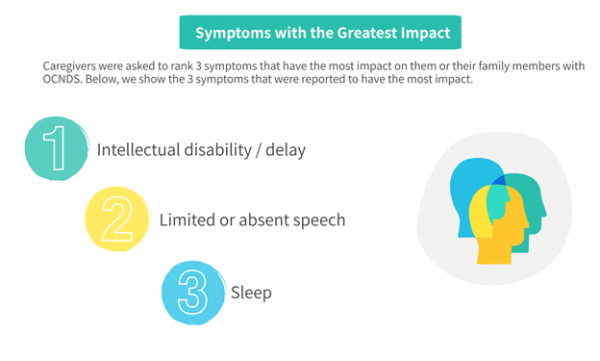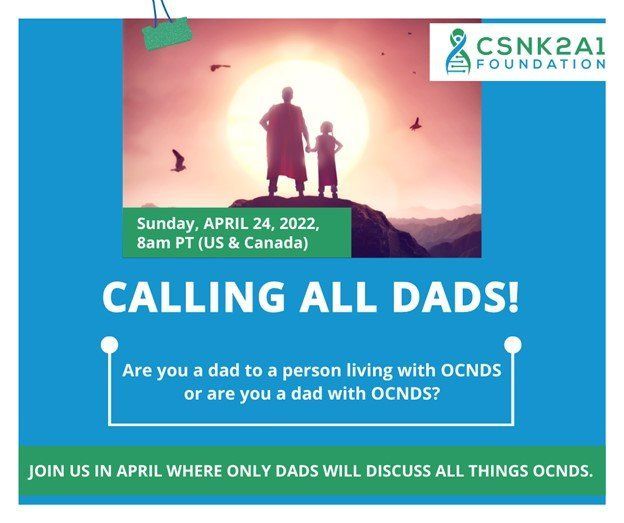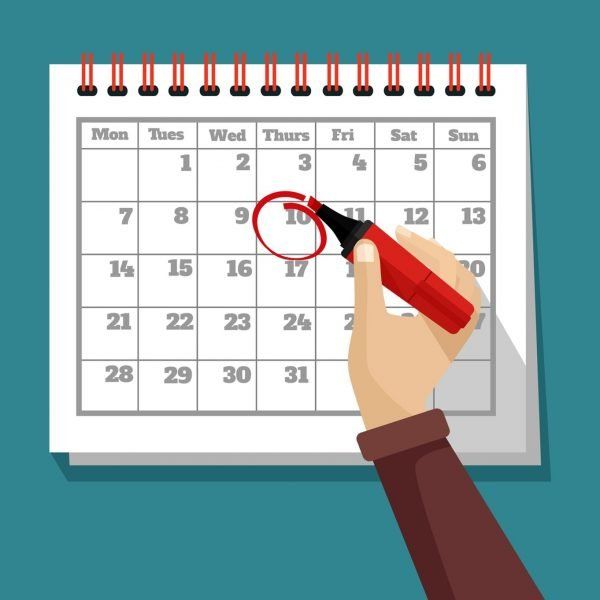Join Us for International OCNDS Awareness Day
April 5th is International OCNDS Awareness Day. Why is April 5th OCNDS Awareness Day?
On April 5, 2016, lives were changed forever. On this day 6 years ago, the first paper was published describing a brand new syndrome called Okur-Chung Neurodevelopmental Syndrome, also known as OCNDS. Initially, there were 5 children identified in the paper with OCNDS. Soon these 5 children would be joined by others around the world. This year's theme is "
No Mountain Too High
".
Tune in on April 5th to learn more.
How can you bring awareness to OCNDS on April 5th?
Wear
GREEN
or
BLUE
to show your support for OCNDS.
Take a picture of yourself wearing a Foundation shirt or wearing Foundation colors and post it to social media using hashtags #OCNDSAwarenessDay #csnk2a1 and tagging the Foundation at @csnk2a1
Share our posts on social media
For the first time in history, Niagara Falls is lighting up for OCNDS on April 5th to recognize International OCNDS Awareness Day
. The Falls will be illuminated Green & Blue at 10:00 p.m. for a fifteen (15) minute duration.
Here is a live cam link to watch this magical event
.
In addition, for the first time ever, The High Level Bridge in Edmonton, Canada will illuminate in recognition of OCNDS on April 25th
. The High Level Bridge has 60,000 LED bulbs that will light up in green and blue to bring Awareness to OCNDS.
Drive for Diagnosis Golf Classic
We are excited that our golf tournament is back in full force this year at the newly restored championship golf course at El Caballero Country Club in Tarzana, California!
It is our largest fundraiser of the year
! On
Monday, April 11, 2022
, we will
Drive for Diagnosis
to support all CSNK2A1 Foundation research programs, including the CSNK2A1 Foundation Research Program at TGen, the Translational Genomics Research Institute in Arizona!
By partnering with TGen, we are helping children who do not have access to genetic testing. Families are not charged for care and genetic testing at TGen. Access to healthcare and social determinants are enormous hurdles to receiving a diagnosis. Whether it is access to health insurance to pay for testing or getting time off work to go to doctor appointments or traveling long distances for care; there are many obstacles impeding families’ ability to receive a diagnosis. For undiagnosed families and children, TGen is the last hope in their diagnostic odyssey which spans many years and countless visits to doctors and specialists.
Thank you to our leading sponsors for your support: The Sills Family, Denise & J. Michael Grossman of Pinnacle Contracting Corporation, Michael A. Grossman, Anita Mann - Allen and Anita Kohl Charitable Foundation, Joan & Charlie Davis, RVW Wealth, and Michael Dahme of Dahme HVAC.
Don't miss out on the fun!
April 11th
is our Golf Classic - our largest fundraiser of the year! For those who can't join, you can still participate in our
Drone Golf Ball Drop
to support OCNDS research!
Here's how it works: Purchase your golf ball(s) for $30 each. Golf balls
can be purchased online until 4.08.22
or until they sell out. A drone will drop numbered golf balls onto a green. The three balls closest to the pin/in the hole will win cash prizes.
You do not need to be present to win!
Buy your golf ball(s) today here
.
Announcing Applications are Open for Our Parent Advisory Board!
We are thrilled to announce that we are selecting our 2022-2024 Parent Advisory Board. Our inaugural board was a tremendous success! We are looking for caregivers and parents who want to be more involved. This is an exciting opportunity for caregivers and parents to make a difference in the lives of those affected by OCNDS. Our Parent Advisory Board advises our Board of Directors, brainstorms ideas, and shares insights from the parent perspective related to OCNDS.
Commitment: *2-year commitment, *PAB Meeting Virtual Calls - 2 hour per month , *Host or Co-host Family Zoom Calls 90 minutes 1x per quarter, *5 hours a month minimum for PAB projects, and *three 2-hour virtual leadership trainings.
Applications are due May 1, 2022
.
APPLY to our Parent Advisory Board Today!
Rare Disease Day 2022 Recap
Everyone has a friend, colleague, or loved one affected by a Rare Disease. On Rare Disease Day we asked people to be a beacon of light for someone living with a rare disease by reaching out to a friend, family member, neighbor, or coworker with a rare disease, so they feel seen and heard. Watch our
2022 Rare Disease OCNDS Video
.
As the sun set on February 28, 2022 at our headquarters in San Francisco, we remembered February 28, 2018, our organization's 1st rare disease day and the day that our Foundation website first launched - The day our lights went on for OCNDS! We are so grateful to every OCNDS family, donor, supporter, and volunteer helping us accelerate OCNDS research! We have big plans for these next 3 years -
The best way to predict the future is to create it. Our lights are always on
!
Giving Tuesday Final Numbers
UPDATED Total!
On November 30, 2021, the world was united by Giving Tuesday, a global day of giving. We launched our
No Family Walks Alone Campaign
. We raised a record-breaking total of
$168,749
from Facebook, Instagram, online donations, and mail-in donations, plus the matching donation. Thank you to all of our donors and supporters for making this a huge success! A heartfelt thank you to Joan & Charlie Davis for matching $50,000 of donations made to the Foundation. Recently, Facebook notified us that they matched $1046 of donations made to CSNK2A1 Foundation for Giving Tuesday.
Thank you to our OCNDS families who participated in our COVID-19 Survey prepared by our Parent Advisory Board. COVID-19 continues to be part of our daily life. We want to provide our community with up-to-date information on how COVID-19 is affecting those with OCNDS. 52 families participated in the survey. We will release the full results soon, but in the meantime many families want to know how those with OCNDS were affected by the COVID-19 virus and what were the short and long-term side effects. 17/52 (32.7%) have been infected by the virus. 35/52 (67.3%) have not been infected. Of the infected, the majority experienced missed school/disruption of routine in the short term and 5 experienced academic/social regression in the long term.
Registration Opening Soon for our Summer 2022 Family Conference
We are excited for our upcoming in-person family conference in Baltimore, Maryland, August 4-7, 2022. Registration will open shortly. If you are unable to attend in-person, there will also be a virtual option. In partnership with Simons Searchlight, we will have a joint family and research conference with 3 other patient organizations. We believe that collaboration across similar conditions and groups will accelerate research that will benefit us all. For the first time, Simons Searchlight is offering grants to researchers to conduct studies at our conference. This is an amazing opportunity for our community to be represented in research. More information to follow.
Number of New OCNDS Families in Q1
In the first quarter of 2022, we found
9 new families
spanning the globe:
Portugal, USA, UK, Norway, France, and Denmark
. Thank you to our volunteer interpreters who helped us connect with some of the new families this quarter.
Our friends at the Angelman Syndrome Foundation put together a
comprehensive guide to help families navigate the insurance process
in their state. Each state has various options of Medicaid and Waivers, which can seem overwhelming and difficult. Our hope is that you find this guide useful and helpful as you try to advocate for your individual with OCNDS. Please note that Waiver wait times, websites, personnel, and funding can change regularly depending on the state and the agency that oversees Medicaid and various programs. Please reach out to us at
info@csnk2a1foundation.org
at any point if you need additional help with insurance in your state. Thank you to the Angelman Syndrome Foundation for putting this guide together and sharing it with rare disease communities!
As part of our
Family Education Webinar Series
, on Saturday, December 11th, we spoke with Lulu Bogolin, Executive Director of Equine-Assisted Therapy, Inc., about the benefits of Equine Therapy.
She covered:
*What is equine therapy
*The benefits of equine therapy
*What to look for in an equine center
*What is the vestibular system
Thank you, Lulu, for donating your time!
Watch this video to learn more about Equine therapy
.
Awareness is the key to acceptance.
We are grateful for all the different ways our community brings awareness to OCNDS.
OCNDS Family Highlight – David Cole
Meet OCNDS parent David Cole. He lives in Alabama and his daughter Adelynn has OCNDS. He is always looking for ways he can make a difference and bring awareness to her condition. In March, he sold 75 boxes of Krispy Kreme donuts outside his local grocer. Thank you to @krispykreme for having this fundraising program in which 50% of your donut sales go to the nonprofit of your choice. We love seeing our OCNDS parents bringing awareness to OCNDS and fundraising at the same time. Way to go, David!
Thank you to those who created Facebook fundraisers to benefit OCNDS research in Q1.
Every dollar counts. Thank you to: Sonia Russi, Katie Keiser, Dhafer Jaziri, Federica Preziosi, and Carissa Cee.
Do you live near Denver, Colorado
? Join the Reynolds family on
April 2 from 4-8pm
for an International OCNDS Awareness Day celebration at Brewability in Englewood, Colorado, which will include Live Music & Giveaways! 15% of the sales benefit CSNK2A1 Foundation research programs. Brewability Lab hires people with developmental disabilities and is accessible for employees and customers.
Global Genes 2022 RARE Compassion Program
Our President Jennifer Sills and her family were selected to participate in the Global Genes 2022 Rare Compassion Program
. The RARE Compassion Program has provided a unique opportunity for medical students to develop relationships with patients and their families experiencing a rare diagnosis, with the goal of developing compassion and awareness for the challenges that individuals diagnosed with a rare disease are faced with every day. This program is committed to addressing inequities and disparities within the medical profession by pairing medical students and patients from underrepresented and/or minoritized communities with the goals of fostering meaningful patient-doctor relationships, improving cultural congruence, and nurturing future advocates in rare disease.
Each year, the program connects medical students with individuals and families with rare diseases to help foster meaningful doctor-patient relationships, inspire careers in rare disease care and research, and ultimately, through patient-centric listening and interactions, build the next generation of future medical professionals as key advocates for their patients.
Jennifer and her family are grateful for this opportunity and are excited to ensure that the next generation of medical professionals are both compassionate and
rare aware
.
Each Monday join us on social media to celebrate
#MilestoneMondays
. We highlight an individual living with OCNDS and celebrate a milestone that they have achieved. Those living with OCNDS have many daily challenges. Some challenges are as basic as swallowing, toileting, dressing, putting on a seatbelt, and making friends. Individuals with OCNDS have to work harder than the average person to reach the smallest of milestones.
We celebrate Adelynn! Adelynn is 4 and has OCNDS. Her mom shared:
"Always trust your Mother instinct! We were told by one of our many Doctors that Adelynn needed a wheelchair and I refused to accept it because all our other Doctors and therapists knew she was going to walk and never stopped rooting for us. I am super proud of my baby. She has worked so hard for this and we knew on her time like everything else she does she would get confident enough to walk! Milestone accomplishment so emotional and HAPPY!"
Way to go, Adelynn! Thank you Adelynn for reminding us to never give up and never stop believing!
RESEARCH UPDATES & OPPORTUNITIES
Meet Dr. Tika Benveniste, Newest Addition to our Scientific Advisory Board
We are thrilled to announce that Dr. Tika Benveniste has joined our Scientific Advisory Board. Dr. Benveniste is Senior Vice Dean for Research, UAB Heersink School of Medicine. She will be a vital part of our SAB. We are excited to work with her.
Read more about Dr. Benveniste here
.
Utilization of AI Technology to find a treatment for OCNDS - mediKanren
Thank you to Matt Might, Ph.D. and his team at the University of Alabama at Birmingham’s Hugh Kaul Precision Medicine Institute (UAB-HKPMI) for using mediKanren to scour millions of publications to identify compounds and small molecules that may be used as a potential treatment for OCNDS. There are more than 50 million total peer-reviewed articles and over 1.5 million publications per year. It is impossible for researchers to keep track of everything discovered in these publications. UAB-HKPMI developed a software reasoning tool called mediKanren. Since the tool’s inception, mediKanren has been successful in finding novel FDA-approved therapeutic recommendations for disorders ranging from undiagnosed and purely symptomatic disease to genetically diagnosed metabolic disorders. We are excited to review these findings at our Scientific Roundtable.
Dr. Okur and Dr. Chung are conducting a study on gene deletion (partial or whole gene) variants in OCNDS. If your child was found to have a deletion in the CSNK2A1 gene and if you are interested, you may contact Dr. Okur at
vokur7@gmail.com
to learn more about study details. If you are unsure if your child has a deletion on CSNK2A1 gene, please contact us at
jennifer@csnk2a1foundation.org
and we will help you read your genetic report.
Young Scientists Taking An Interest in OCNDS at Vanderbilt University
We are thrilled that one student chose to study our syndrome for the rest of the semester and is writing a disease conceptual model for OCNDS. We love seeing young scientists take an interest in our ultra-rare syndrome. Thank you to Professor Terry Jo V. Bichell, Ph.D., MPH.*, for this fantastic opportunity.
*Dr. Bichell is also the Founder/Director of
COMBINEDBrain
.
Will You Be A Game-Changing OCNDS Family?
Dr. Wendy Chung and Dr. Volkan Okur first identified Okur-Chung Neurodevelopmental Syndrome (OCNDS) in 2016. Most physicians and providers have never heard of OCNDS. When someone is diagnosed with OCNDS, there are no clinical care guidelines for physicians.
What are clinical care guidelines?
Clinical practice guidelines
are recommendations on how to diagnose and treat a medical condition such as OCNDS
. Clinical care guidelines are meant to help ensure that patients receive appropriate treatment and care. Currently, care varies wildly from patient to patient without these guidelines.
WE CAN CHANGE THIS!
Steps to Become a Game-Changing Family
- Sign up for Simons Searchlight
www.simonssearchlight.org
- Upload the genetic report of loved one with OCNDS to Simons Searchlight
- If you don’t have the genetic report, no problem. You can sign a consent form and Simons Searchlight will get the report for you.
- Schedule your medical history phone interview
- Complete your medical history phone interview
*Languages supported: English, Spanish, French & Dutch (other languages coming soon)
The Simons Searchlight Voice of the Community
Have you read the newest OCNDS results from a special survey called The Simons Searchlight Voice of the Community? The results include specific data and information about our community, including the top 3 symptoms that have the most impact on those with OCNDS: 1) Intellectual disability/delay 2) limited/absent speech and 3) sleep.
Thank you to everyone who contributed their unique information and insight!
View the report here
.
Simons Searchlight Registry Infographic
Every quarter, Simons Searchlight publishes a quarterly registry report with updated data on Simons Searchlight CSNK2A1 participants.
Click here to read the report
. If you want to be included in future reports,
join Simons Searchlight today
! Data presented in this report is primarily gathered from the medical history phone call.
CSNK2A1 Foundation hosts a quarterly Scientific Roundtable to bring together diverse researchers, clinicians, and innovators from around the globe to exchange ideas and accelerate the path towards treatment for OCNDS. These roundtables play a vital role in setting our OCNDS research agenda.
On March 31st, our Scientific Advisory Board and 2 board members hosted 6 institutions and 12 foundation-funded researchers to hear research updates and to discuss next steps. We were thrilled to hear how our researchers are successfully sharing data and collaborating together. We are looking forward to our next roundtable in June.
For information or inquiries about our Quarterly Scientific Roundtable, please email
research@csnk2a1foundation.org
.
Our Parent Advisory board hosts monthly Family Zoom calls. Families across the globe join. We use Wordly to provide live caption translation so ALL families can participate regardless of their native language. Everyone in our community benefits from more perspectives, more allies, and more hope! On these calls, we share the successes and challenges of OCNDS. We discuss everything OCNDS including toileting, anxiety, behavior, toileting, sleeping, transitioning into adulthood and many other issues our loved ones face when living with OCNDS.
These calls serve as a lifeline for many families struggling with basic daily activities. At the end of each call, we ask every participant to say one word that describes how they are feeling at the end of the call. We frequently hear:
"Connected"
,
"Grateful"
,
"Not alone"
,
"Understood"
,
"Excited"
, "Togetherness",
"Hopeful"
, and
"Supported"
. Join us for our next call. Our next Family Zoom call is on April 9, 2022.
Register for our April Family Zoom call now
!
Are you a dad to a person living with OCNDS or are you a dad with OCNDS? Brian Reynolds, OCNDS parent to Harper, is hosting a Zoom call for all Dads on Sunday, April 24th at 8am Pacific Time.
Register for the Zoom call for Dads now!
We also have families connect via region or country through WhatsApp or Facebook Messenger to talk more specifically about issues that are specific to their geographic area. If you haven’t joined our smaller WhatsApp or Messenger groups, please contact Jennifer at
jennifer@csnk2a1foundation.org
and we can direct you to the appropriate group.
January Australia OCNDS Family Zoom Call
February OCNDS Family Zoom Call
January OCNDS Family Zoom Call
March OCNDS Family Zoom Call
As you are navigating this diagnosis, there are steps you can take to get informed, connected, and make an impact today!
One of the easiest ways to help bring awareness to OCNDS is by sharing our content across social media. One easy way to get involved is to “like” our
Facebook page
and ask your friends to “like'' our page. Follow us on
Twitter
,
Instagram
, and
Linkedin.
Have special skills or talents and would like to donate your time?
There are many volunteer opportunities available at the Foundation. Email us at
volunteer@csnk2a1foundation.org
to get involved.
Friends, family, and providers can join our closed Facebook group to share ideas and learn more about OCNDS.
Join our Facebook group now
.
